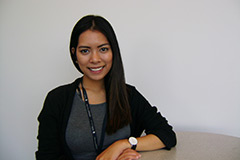Go east, young researcher
By Betty Zou
“I think the heart is an amazing organ,” says Karla Rebullar. She fell in love with the muscular organ during the cardiovascular block of courses in her first year of medical school at the University of British Columbia. Eager to gain experience in heart-related research, she contacted doctors and scientists working in the area and hoped for a response.
One of the scientists who wrote back to her was Dr. Dennis Ko, a scientist in the Schulich Heart Research Program at Sunnybrook Research Institute (SRI) and an interventional cardiologist at Sunnybrook.
“I think Dr. Ko is doing a lot of high-impact research [that is] looking at populations and effecting health care improvements,” she says. “Big populations, big data, high impact—that really attracted me to working with him.”
This summer Rebullar, a D+H SRI summer student, is conducting systematic literature reviews and combing through published and unpublished data to identify gaps in the health care system. “The ultimate goal is to improve the management and outcomes for patients with cardiovascular disease in Canada,” says Rebullar, who has lived in Vancouver since moving there from the Philippines when she was 14. She will be entering her second year of medical school in the fall.
Her project at SRI differs dramatically from the research she did as an undergraduate student studying chemistry at UBC. Her work there focused on drug synthesis and the development of new compounds for cancer diagnosis and therapy.
“Coming from a chemistry background, everything is very new to me,” she says. “The most difficult part is the fact that I had never done any sort of database research before.”
This isn’t the first time that she has had to overcome a steep learning curve. Having only taken the basic prerequisite life sciences courses during her undergraduate studies, Rebullar found herself making up for lost ground in her first year of medical school. She credits her chemistry training for giving her a unique approach to tackling the challenging course load of medical school. “I think chemistry trained me to become a better critical thinker and problem solver,” she says. “It’s not just all about memorization.”
Rebullar says students should not be afraid of learning curves when thinking about potential research jobs—getting over that initial hurdle is itself a big accomplishment. She urges students to contact professors and doctors early in December and January for research jobs in the summer because many of the funding application deadlines are in February and March.
In addition to pursuing her research endeavours, Rebullar has made the most of her time in Toronto, taking in the many festivities and events happening around town as part of this summer’s Pan American Games.
“Toronto is very different from Vancouver,” she says. “There’s not a lot of hiking [here]. It’s more fast-paced, and there’s always something going on.” A self-professed foodie, she admits that the city’s vibrant culinary scene is one of the reasons why she was excited to come to Toronto this summer.
The opportunity to do cardiovascular health research plus the chance to experience a new city—sounds like a perfect combination.



